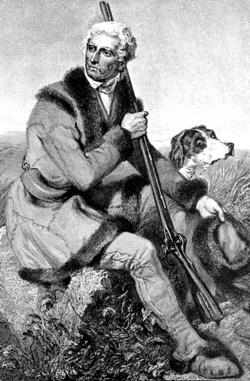Longhunter

Daniel Boone, one of the most famous longhunters, on the early American frontier
|
|
| Occupation | |
|---|---|
| Names | Longhunter, long hunter |
| Description | |
| Competencies | Trapping, hunting, fishing, skinning, marksmanship, self-defense, trading, canoeing, horsemanship, tracking, exploring, mental and physical toughness, wilderness survival skills, folk medicine, frontier doctoring, diplomacy, English, French, Spanish, and Native American languages |
|
Related jobs
|
Coureur des bois, Mountain man |
A longhunter (or long hunter) was an 18th-century explorer and hunter who made expeditions into the American frontier wilderness for as much as six months at a time. Historian Emory Hamilton asserts that "The Long Hunter was peculiar to Southwest Virginia only, and nowhere else on any frontier did such hunts ever originate" although the term has been used loosely to describe any unofficial American explorer of the period. Most long hunts started in the Holston River Valley near Chilhowie, Virginia. The hunters came from there and the adjacent valley of the Clinch River, where they were land owners or residents. The parties of two or three men (and rarely more) usually started their hunts in October and ended toward the end of March or early in April.
The information gathered by longhunters in the 1760s and 1770s would prove critical to the early settlement of Tennessee and Kentucky. Many longhunters were employed by land surveyors seeking to take advantage of the departure of the French from the Ohio Valley at the end of the Seven Years' War. Some later helped guide settlers to Middle Tennessee and southeastern Kentucky.
As colonial settlement approached the base of the Appalachian Mountains in the early 18th century, game in the Piedmont region became more scarce. Merchants returning from trade missions to Overhill Cherokee villages in the Tennessee Valley brought back news of the abundance of game west of the range, and began taking hunters along on their trade expeditions. In 1748 and 1750, Thomas Walker crossed the mountains and explored the Holston River valley, recording and widely publicizing the location of Cumberland Gap— a pass near the modern border of Virginia, Kentucky, and Tennessee— which allowed relatively easy access to the headwaters of the Tennessee and Cumberland rivers.
...
Wikipedia
